UNITED NATIONS, July 20 -- At the end of a less than successful term as the UN's chief investigator, Inga Britt Ahlenius on July 16 delivered a 50 page “end of assignment report” trashing, largely deservedly, Secretary General Ban Ki-moon. At the same time, and some media but not this one think by the same person, the memo was leaked to Turtle Bay, which published not the 50 page memo but only a three-page cover letter on July 20.
While few reporters went to that day's noon briefing to grill Ban's spokesman about the cover letter, as they did when Norway's deputy ambassador Mona Juul in a fully leaked memo similarly bashed Ban, some secondary coverage has emerged, largely siding with Ahlenius but concluding that a second term for Ban Ki-moon is nearly inevitable.
The first question, however, is why did Ahlenius wait until the end of her term to make her critique known? If leaving posts in her office empty was so debilitating, if investigations were impossible without Connecticut's Robert Appleton, why did Ahlenius stay quiet?
Repeatedly, Inner City Press and others asked for Ahlenius to come and take questions. For Inner City Press, this began when a whistleblower leaked an Ahlenius e-mail asking then Management chief Alicia Barcena to be sure to be on the selection panel and give a job to Ahlenius' friend Ms. Danielle Coolen. Click here for the story, here for Ms. Ahlenius' email.
Ahlenius never responded to requests to explain this presumptive nepotism. So much for accountability.
The review of l'affaire Ahlenius, then, is a plague on both their houses. Yes, Ban and his cardinal Kim Won-soo tried to undermine the UN's system of independent investigations. But Inga Britt Ahlenius accomplished less and less in each year of her tenure.
Purportedly heroic Appleton, who made his name by leaking to large American media outlets, never investigated the $250 million sole source Darfur contract that American UN official Jane Holl Lute awarded to Lockheed Martin for “super camps” that were never built. Because Appleton and Ahlenius were playing to a elite public, they never felt a need to explain this.
At the June 20 noon briefing, Inner City Press asked Ban's spokesman Martin Nesirky to substantiate claims in Vijay Nambiar's response, such as that Ban has somehow strengthened whistleblower protections.
Inner City Press asked, was Alan Doss held accountability, when action on a finding of wrong doing in asking for “leeway” in getting his daughter hired by UNDP is still being delayed, until after Doss' retirement?
Nesirky's response lurched around about climate change and gender balance, along with saying that perhaps Nambiar will come and take questions, which has never happened, even on war crimes issues.

Ahlenius and Appleton Jan 08, then no briefing for 2 1/2 years
Inner City Press threw Nesirky a softball, asking if opposition to Appleton didn't come from Singapore and Russia, the latter a Permanent Five member of the Security Council which could deny Ban a second term. Nesirky said he wasn't aware of that.
Later, several senior Ban administration officials told Inner City Press they thought this storm would pass, including in light of how few journalists showed up to ask Nesirky about it. But one reason for this is the continued non availability of the 50 page memo itself.
A person familiar with the memo has told Inner City Press that while on investigations Ahlenius has the conflicts of interest summarized about, some of the critique goes beyond it, to Ban's overall performance in “MONUC [sic - MONUSCO] and MINURCAT... Myanmar, Darfur, Afghanistan, Cyprus, G20.”
For Ms. Ahlenius and her Appleton, question whether their unwillingness to investigate the corrupt sole source grant of a $250 million dollar contract in Darfur to Lockheed Martin didn't contribute to UN loss of relevance. But there is and will be more. Watch this site.
From the July 20 UN noon briefing transcript:
Inner City Press: I’m sure you are aware of this controversy of the exit memo by Ms. Ahlenius and Mr. Nambiar’s response. At least as of now, Nambiar’s response to it says, makes various criticisms, but presents as a defence of the Secretary-General that he has been, among other things, on accountability, that he has strengthened whistleblower protections and held people accountable. Maybe you could describe what the strengthening of the whistleblower protections are, and state, for example, if Alan Doss, with an OIOS [Office of Internal Oversight Services] report sitting on Ban Ki-moon’s desk for a while now, was he held accountable? Was Shabaan Shabaan, with a pending case, and the court decision, I guess, is there some opportunity, seeing now Mr. Nambiar’s response to the press on these issues, to dig into them a little bit and either have them come give a briefing, or to substantiate what is said in his memo? And also to get a copy of the 50-page Ahlenius exit? Only the cover page is online.
Spokesperson Nesirky: That’s presumably thanks to the journalistic endeavours of the Washington Post correspondent. There is the three-page summary there that you’ve been able to read.
Inner City Press: Nambiar’s thing is a public document, right?
Spokesperson: Mr. Nambiar’s, the Chef de Cabinet’s, document is out there, it’s also linked on the Washington Post and the foreignpolicy.com sites — as you quite rightly say, that this is the Chef de Cabinet on behalf on the Secretary-General, addressing specific points that had been raised by Colum Lynch in his researching and writing of the pieces that he did. So the response from Mr. Nambiar very specifically is geared to the questions that Mr. Lynch had raised. And as you also mentioned on accountability, there are any number of different measures that had been undertaken, not just by the Secretary-General. I think this is an important point, that this is part of a process that is constantly evolving. Accountability is something that has been there from the start, and successive Secretaries-General have sought to improve it, to strengthen it, in different ways. This Secretary-General came into office with precisely that aim, to strengthen accountability and transparency. He has been doing that; the specific examples that Mr. Nambiar has quoted speak for themselves. I will relay your request to him. He’s probably watching now and has heard it himself....
Inner City Press: It seems like a lot of this revolves around Robert Appleton, who used to be the head of the Procurement Task Force?
Spokesperson: One fifth of it revolves around that.
Inner City Press: This isn’t the softball I’m throwing you, Martin. Is it true that Russia and Singapore have opposed Mr. Appleton being considered for any post within OIOS? And if not, could this be, is the Secretariat aware of opposition by Russia, Singapore, and other countries investigated during Mr. Appleton’s tenure?
Spokesperson: First of all, we wouldn’t necessarily be privy to any country’s preference or opposition necessarily, I’m certainly not aware of that kind of pressure being brought to bear, and what I can say is that this one case that is repeatedly referred to, and as I said takes up a large chunk of this end-of-assignment report, which is an internal management tool; a very valuable management tool is the way that one likes to look at these end-of-assignment reports, when they are put together in the right constructive fashion. But what one also has to stress is that this is not one particular individual, this is about due process, about the rules for recruitment within the Organization as a whole, not just for one division, department, one part of the Organization. This is a standard rule that applies to all appointments throughout the system, within the different departments and divisions and so on, that there are. That’s the way it is.
Watch this site.




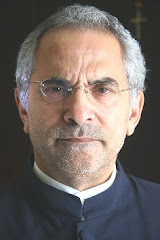
















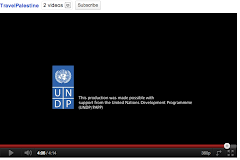

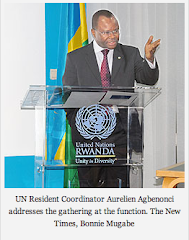



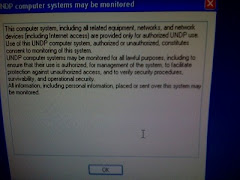

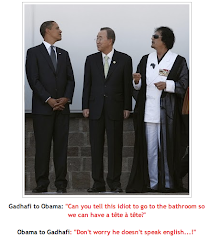
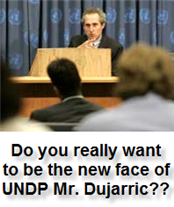






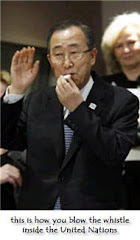
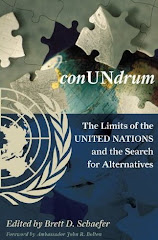

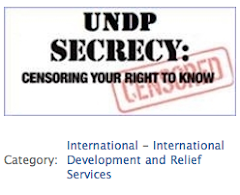



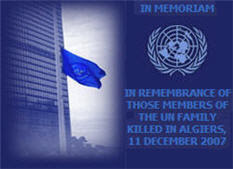



No comments:
Post a Comment